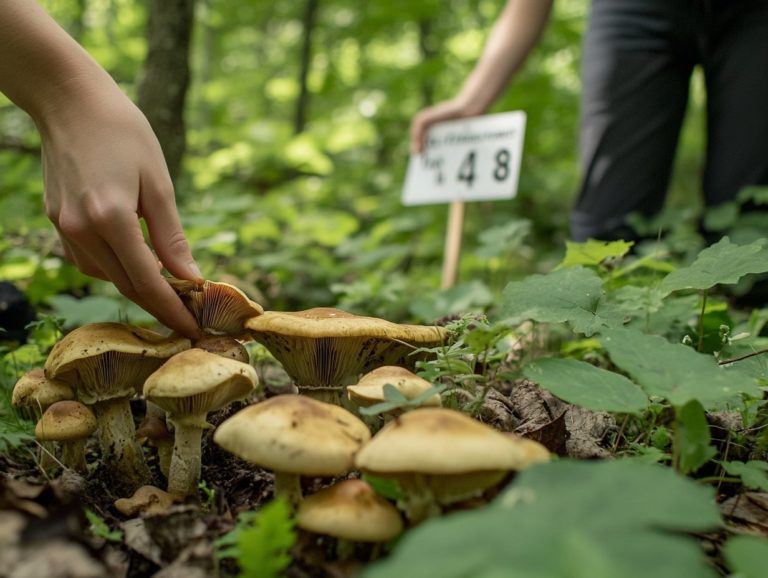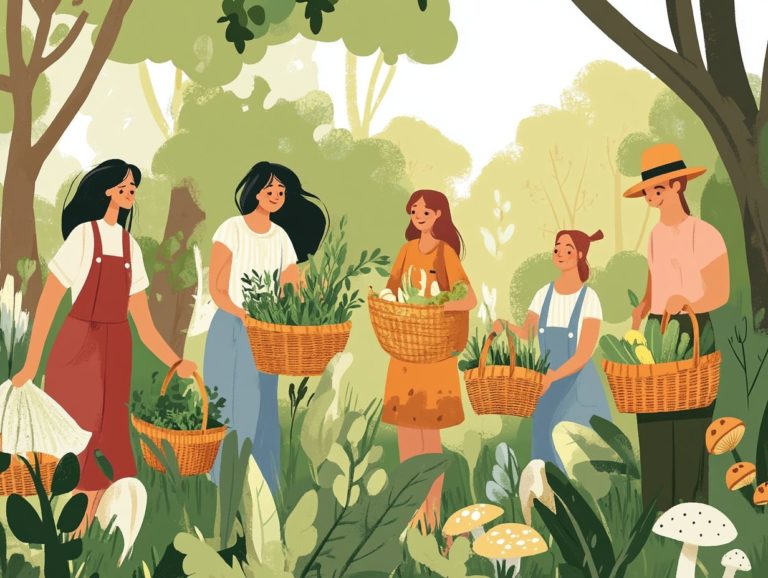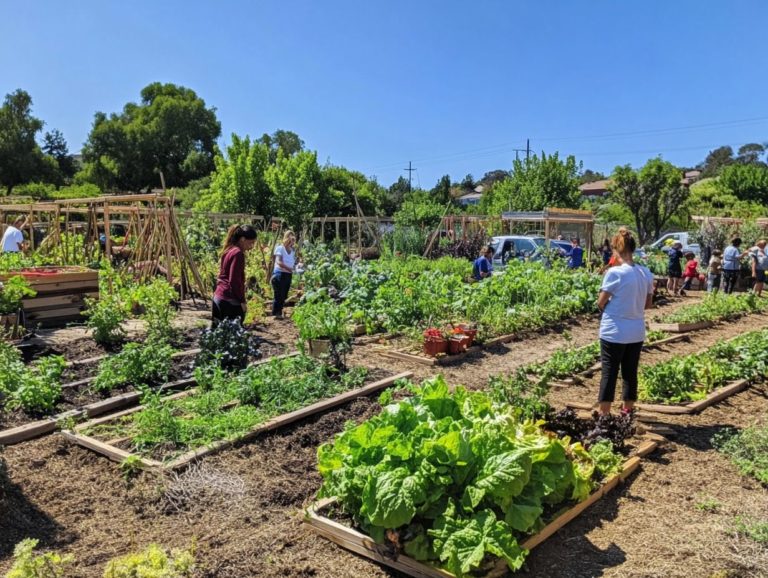Sustainable Foraging and Climate Action
Sustainable foraging transcends mere trend; it represents a vital practice that deepens your connection to the environment while playing a pivotal role in climate action.
As you delve into the importance of foraging, you’ll uncover its myriad positive impacts on ecosystems, from boosting biodiversity to lowering carbon footprints. This article offers insights into the benefits of sustainable foraging, practical tips for responsible harvesting, and the challenges associated with preserving this time-honored practice.
Engage in understanding how foraging can enhance not only the health of our planet but also your own nutritious lifestyle.
Contents
Key Takeaways:
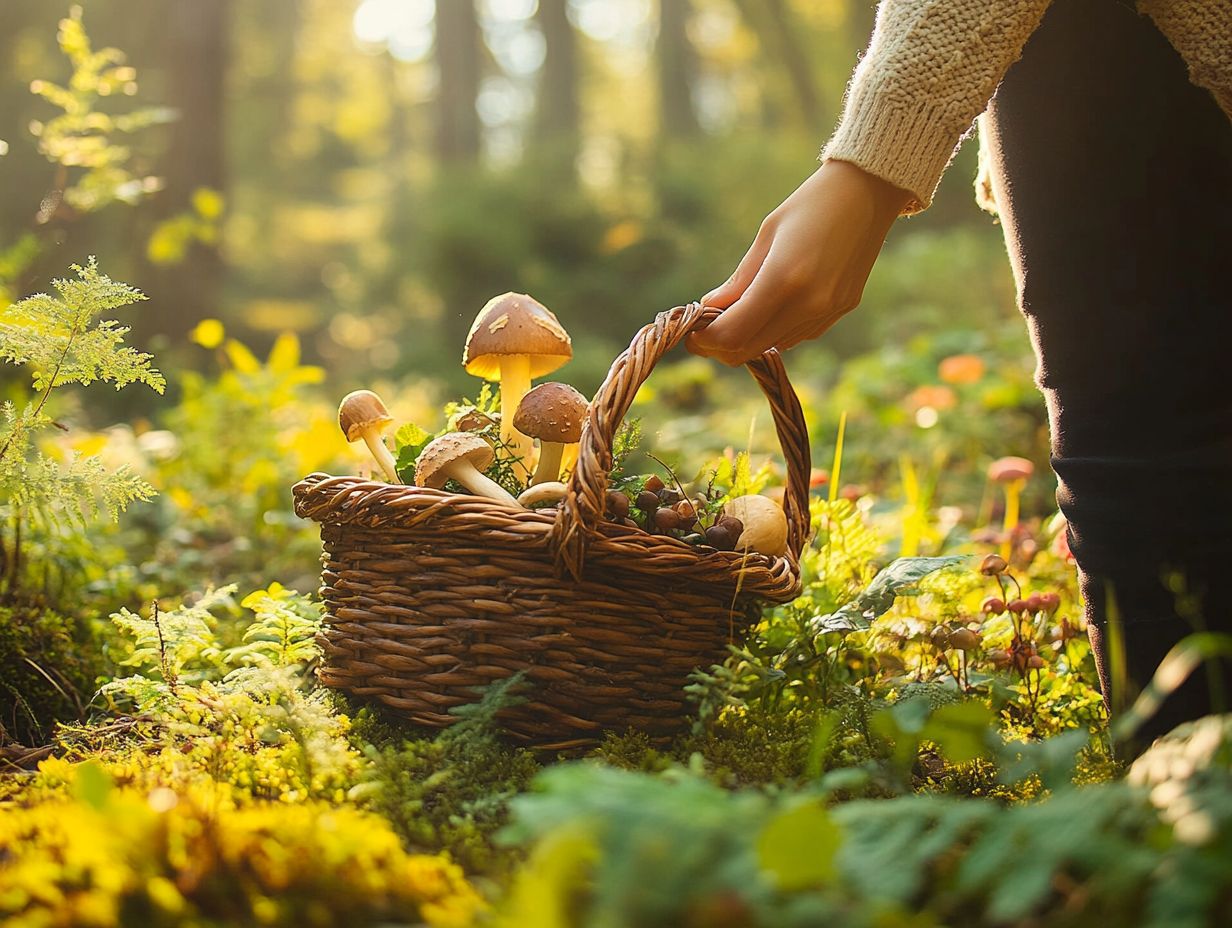
- Sustainable foraging supports a healthier environment by reducing carbon footprint and supporting biodiversity and ecosystem health.
- By practicing sustainable foraging, we can enjoy both environmental and nutritional benefits while minimizing negative impacts on the environment.
- Collaborative efforts and solutions are necessary for long-term sustainability and overcoming obstacles to sustainable foraging.
The Importance of Sustainable Foraging
Sustainable foraging is vital for nurturing eco-consciousness in your community, offering a unique opportunity to connect with nature while dramatically lowering the carbon footprint tied to traditional food production. Utilizing technology for sustainable foraging can enhance this experience even further.
By looking into sustainable alternatives within the agricultural sphere, you can gain a deeper understanding of how your choices affect the environment. This practice does more than just promote biodiversity; it also fosters responsible harvesting of edible resources, contributing positively to the ecosystems you inhabit.
By engaging in foraging education, you can help reduce environmental harm and support local food sources. This allows you to make informed decisions about what you eat.
Understanding Foraging and its Impact on the Environment
Understanding foraging invites you to recognize its profound impact on the environment. As you seek out wild foods, you enrich biodiversity.
By engaging with local ecosystems, you play a vital role in maintaining and enhancing the natural balance among various species. Foraging offers nutritional benefits by allowing you to enjoy a diverse array of edible plants and fungi while promoting the sustainable management of local vegetation.
This practice not only nurtures the growth of native species but also curbs invasive ones, safeguarding the overall health of the environment. Fostering biodiversity within food systems ensures resilience against pests and diseases, ultimately leading to more robust ecosystems that can adapt to changing climatic conditions.
Embracing foraging is not just a culinary adventure; it s a commitment to nurturing the world around you.
Benefits of Sustainable Foraging
Sustainable foraging offers a wealth of benefits, enhancing both the environment and your personal health. By emphasizing ethical harvesting practices and sourcing food locally, it not only nurtures the ecosystem but also bolsters food security, highlighting the role of foraging techniques in sustainability.
This mindful approach fosters a deeper connection with nature. It ensures that the bounty you gather supports local communities and ecosystems alike.
Environmental Benefits
The environmental benefits of sustainable foraging are nothing short of remarkable. By embracing this practice, you play a crucial role in reducing environmental harm and minimizing reliance on synthetic fertilizers, ultimately leading to lower greenhouse gas emissions.
When you promote the use of native plants and wild edibles, you re actively helping to maintain local ecosystems and enhance biodiversity, allowing various species to thrive in their natural habitats.
This approach not only conserves resources that would typically support commercial agriculture but also aids in the preservation of rare plant species, which are essential for maintaining ecological balance.
By cutting down the carbon footprint linked to food transportation, your efforts as a forager make a significant contribution to combating climate change, ensuring a healthier planet for future generations.
Nutritional Benefits

The nutritional benefits of sustainable foraging are remarkable. This practice allows you to access a diverse array of edible plant species that enrich your plant-based diet with essential nutrients.
This method guarantees a fresh supply of vitamins and minerals often easier for your body to use than what you find in commercial produce. You will discover incredible flavors and textures that can elevate your meals. By incorporating wild foods like dandelion greens, nettles, and wild garlic into your diet, you tap into a treasure trove of antioxidants and phytonutrients, which are natural compounds in plants that help keep you healthy.
Embracing these locally sourced options helps you forge a deeper connection with your environment while promoting sustainable practices that benefit both your well-being and the ecosystem.
How to Practice Sustainable Foraging
Practicing sustainable foraging requires a thoughtful approach to identifying and harvesting edible plant species. Ensure that you adhere to ethical guidelines while using a comprehensive foraging checklist.
This not only promotes safe foraging practices but also respects the delicate balance of nature.
Identifying and Harvesting Sustainably
Identifying and harvesting sustainably is crucial for you as a forager. Learn to recognize wild botanicals and be vigilant about invasive species that threaten local ecosystems.
Mastering the art of plant identification elevates your foraging skills and helps preserve native flora. Understanding the characteristics of these plants, along with their invasive counterparts, is essential for maintaining ecological balance.
Adopt practices that minimize harm to local environments, such as selectively harvesting certain species and ensuring the ongoing vitality of essential ecosystems. Cultivating a deeper appreciation for the natural world enhances your responsible foraging behavior.
Enjoy nature s bounty while safeguarding its future.
Effective Techniques for Sustainable Foraging
Implementing best practices for sustainable foraging allows you to engage in ethical foraging while enhancing community access to local food sources. By prioritizing the health of local ecosystems, you can learn to identify wild edibles responsibly and avoid over-harvesting.
Participating in foraging tours offers a unique chance to connect with knowledgeable guides who share invaluable insights about local flora and fauna. These interactive experiences educate you about the importance of maintaining biodiversity and reinforce sustainable practices benefiting both the environment and your community.
As you join your community in embracing these practices, cultivate a deeper appreciation for your natural surroundings and promote local food sovereignty.
The Role of Foraging in Climate Action
Foraging serves as a crucial element in climate action, offering you a distinctive way to lower your carbon footprint. By engaging in this practice, you can discover the benefits of sustainable foraging, support biodiversity, and contribute to the overall health of ecosystems.
Join the movement and start foraging today to make a difference!
Reducing Carbon Footprint through Foraging

Reducing your carbon footprint through foraging practices is not just possible; it s an enriching experience. When you source your food locally, you effectively minimize transportation emissions and reap substantial environmental benefits.
By embracing the bounty of your natural surroundings, you cultivate a deeper connection to the land, fostering more sustainable consumption habits. When you choose wild edibles over conventionally farmed produce, you savor fresher options and contribute to biodiversity while supporting local ecosystems.
This conscious choice reduces reliance on industrial farming methods, linked to high carbon emissions from fertilizers and transportation. As a result, you play a vital role in nurturing healthier soil and promoting balance within local wildlife populations.
This is an exciting reminder that thoughtful choices in food sourcing can lead to far-reaching positive impacts on both the environment and community health.
Supporting Biodiversity and Ecosystem Health
Supporting biodiversity and ecosystem health is a crucial outcome of your sustainable foraging efforts. As a forager, you help maintain diverse populations of wild foods and natural resources.
This practice encourages the growth of various plant and animal species while allowing you to forge a deeper connection with your local ecosystem. By respecting seasonal cycles and employing thoughtful harvesting methods, you promote habitat resilience, ensuring that species can flourish in harmony.
Foraging cultivates a profound appreciation for nature’s resources, leading you to become a responsible steward of the environment. When approached mindfully, your foraging activities can significantly reduce the carbon footprint linked to commercial food production, creating a beneficial ripple effect that nurtures both the health of the planet and the communities that depend on it.
Challenges and Solutions for Sustainable Foraging
The challenges and solutions for sustainable foraging involve a range of factors that influence the practice. You’ll need to consider the environmental impact of urban soil conditions, as well as the existence of food deserts that restrict access to wild foods and other natural sources.
Overcoming Obstacles to Sustainable Foraging
To forage sustainably in cities, you need creative solutions, especially where ecological degradation may obstruct access to wild food sources. Understanding the impacts of climate change is essential in navigating these challenges, as highlighted in the guide on sustainable foraging best practices.
Join your neighbors in forming urban foraging networks that educate and inspire! By organizing workshops and guided foraging tours, you can learn to identify edible plant species and mushrooms that flourish even in the heart of the city, while also ensuring safe foraging.
In several neighborhoods, green spaces and community gardens have been initiated to promote biodiversity. These initiatives not only support environmental benefits but also encourage responsible management of local vegetation. This is essential for ecosystem management and community access to vital resources. Get involved in your local garden today!
Collaborative Efforts and Solutions for Long-Term Sustainability
Collaborative efforts and innovative solutions for sustainable foraging are crucial. They enhance community access to resources and champion ethical foraging practices that strengthen food systems.
By engaging diverse stakeholders such as local organizations, community members, and policymakers these collective initiatives can significantly elevate food security and foster resilience in vulnerable populations. This approach addresses issues like transportation emissions tied to industrial farming practices.
As you share knowledge and resources with others, you ll discover the importance of preserving native plant species and understanding seasonal influences. This enables informed choices that benefit both the environment and your community while creating a foraging checklist to track your findings.
Encouraging open dialogues cultivates a sense of ownership and responsibility. This ensures that sustainable practices are not just implemented but celebrated. This approach leads to healthier ecosystems and communities that thrive together, particularly through the promotion of ethical foraging methods that help mitigate issues like nutrient depletion and toxic plants.
Frequently Asked Questions
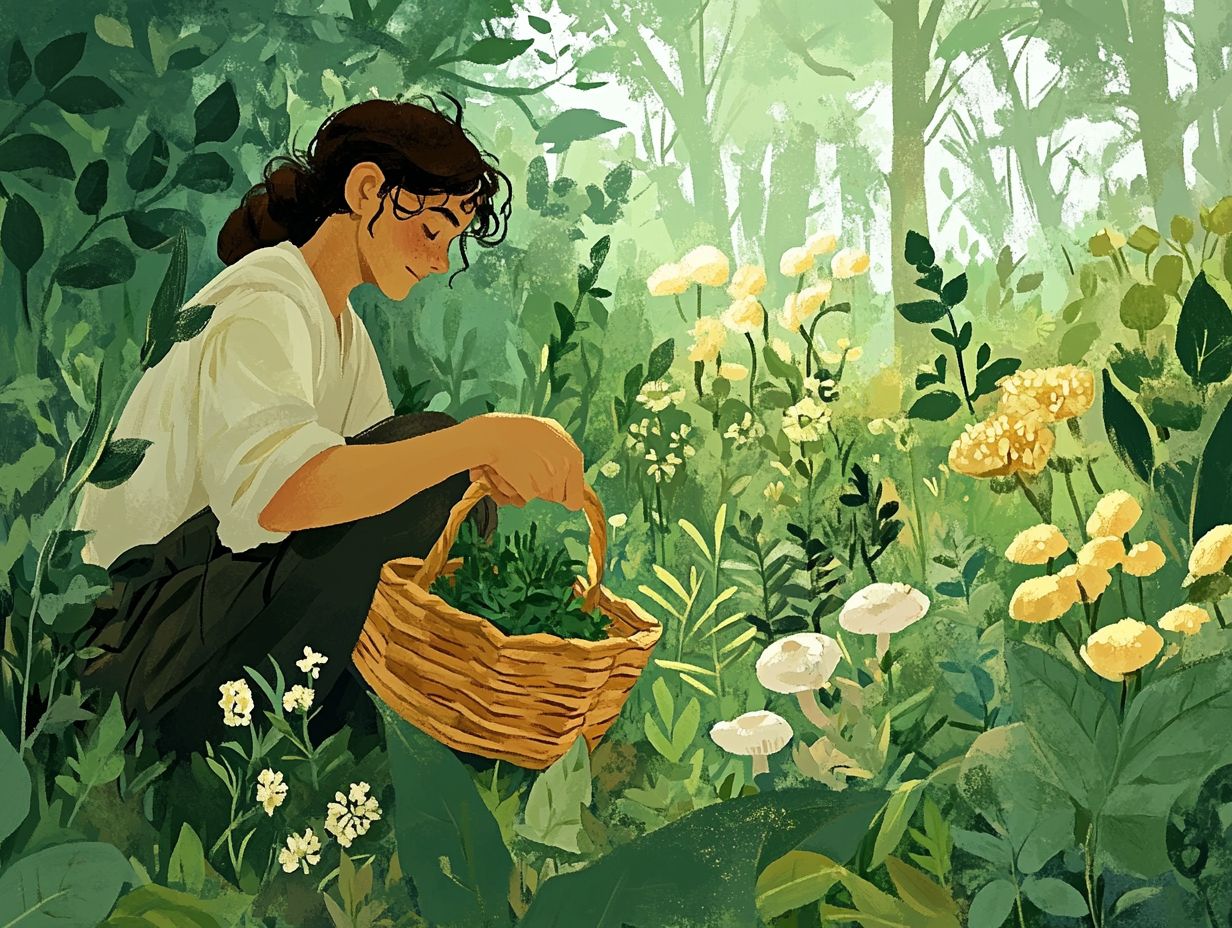
Here are some common questions about sustainable foraging:
What is sustainable foraging?
Sustainable foraging means picking wild plants, fungi, and other natural resources in a way that does not harm the environment or deplete the resources for future generations. Understanding the role of education in sustainable foraging is crucial for ensuring these practices are followed.
How does sustainable foraging contribute to climate action?
Sustainable foraging helps lessen our environmental impact by reducing the need for industrial agriculture, a major contributor to greenhouse gas emissions. Additionally, it emphasizes the role of community in sustainable foraging, protecting a variety of plants and animals while safeguarding natural habitats.
What are some sustainable foraging practices?
Some sustainable foraging practices include only taking what you need, leaving some of the plant or resource for wildlife, and avoiding harvesting in sensitive or protected areas.
Why is it important to forage sustainably?
Foraging sustainably is vital for keeping our natural resources healthy and available for the future! By practicing sustainable foraging, we can also support local ecosystems and preserve traditional knowledge and practices. This is particularly important in the face of challenges posed by invasive species and deforestation, as highlighted in the future of foraging.
Can foraging be harmful to the environment?
Irresponsible foraging can harm the environment. Overharvesting, disturbing animal habitats, and damaging plant populations may lead to soil erosion and further ecological degradation.
How can individuals incorporate sustainable foraging into their daily lives?
Individuals can incorporate sustainable foraging into their daily lives by learning about the plants and resources in their local area. Obtain necessary permits or permissions for foraging, and respect the environment and its inhabitants while gathering resources especially through the adoption of plant-based diets that reduce reliance on the agricultural practices of the past.
Join us in making a difference start your sustainable foraging journey today!



